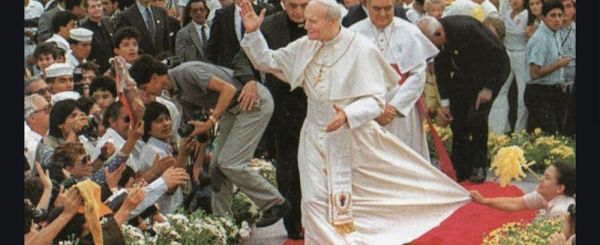5. As the cross can be reduced to being an ornament, “to carry the cross” can become just a manner of speaking. In the teaching of Jesus, however, it does not imply the pre-eminence of mortification and denial. It does not refer primarily to the need to endure patiently the great and small tribulations of life, or, even less, to the exaltation of pain as a means of pleasing God. It is not suffering for its own sake that a Christian seeks, but love. When the cross is embraced it becomes a sign of love and of total self-giving. To carry it behind Christ means to be united with him in offering the greatest proof of love.
We cannot speak about the cross without considering God’s love for us, the fact that God wishes to shower us with good things. With his invitation “follow me”, Jesus not only says again to his disciples: take me as your model, but also: share my life and my choices, and stake your life for love of God and for neighbour together with me. This is how Jesus opens up before us the “way of life”. Unfortunately, this is constantly being threatened by the “way of death”. Sin is this way that separates a person from God and neighbour and brings about division and undermines society from within.
The “way of life” continues and renews the mind of Christ in us and becomes the way of faith and conversion. It is indeed the way of the cross. It is the way that leads one to trust in him and his plan of salvation, and to believe that He died in order to show God’s love for each one. It is the way to salvation in a society often divided, confused and contradictory. It is the way to the happiness found in following Christ right to the end, in the sometimes dramatic circumstances of daily life. It is the way that does not fear failure, difficulties, isolation, loneliness, because it fills our hearts with the presence of Jesus. It is the path of peace, self-control and a joyful heart.
6. My dear young people, do not think it strange that, at the beginning of the third millennium, the Pope once again directs you towards the Cross of Christ as the path of life and true happiness. The Church has always believed and proclaimed that only in the Cross of Christ is there salvation.
There is a widespread culture of the ephemeral that only attaches value to whatever is pleasing or beautiful, and it would like us to believe that it is necessary to remove the cross in order to be happy. The ideal presented is one of instant success, a fast career, sexuality separated from any sense of responsibility, and ultimately, an existence centred on self affirmation, often bereft of respect for others.
Open your eyes and observe well, my dear young people: this is not the road that leads to true life, but it is the path that sinks into death. Jesus said: “Whoever wishes to save his life will lose it, but whoever loses his life for my sake will save it.” Jesus leaves us under no illusions: “What profit is there for one to gain the whole world yet lose or forfeit himself?” (Lk 9:24-25). With the truth of his words that sound hard but fill the heart with peace, Jesus reveals the secret of how to live a true life (cf. Talk to the young people of Rome, 2 April 1998).
Therefore, do not be afraid to walk the way first trodden by the Lord. With your youthfulness, put your mark of hope and enthusiasm, so typical of your age, on the third millennium that is just beginning. If you allow the grace of God to work in you, and earnestly fulfill this commitment daily, you will make this new century a better time for everyone.
[Pope John Paul II, Message for the 16th World Youth Day, 14 February 2001]












